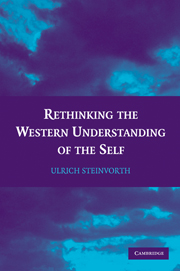Book contents
- Frontmatter
- Contents
- Preface
- Part I Introduction
- Part II Basics of Philosophical Psychology
- Part III The Cartesian Self in History
- Part IV Value Spheres
- Chapter 10 A First Diagnosis and Therapy for Modernity
- Chapter 11 Value Spheres Defined and the State
- Chapter 12 The Serving Spheres
- Chapter 13 Technology
- Chapter 14 Utilitarian or Cartesian Approach
- Chapter 15 The Media and the Professions
- Chapter 16 Science
- Chapter 17 Art and Religion
- Chapter 18 Sport
- Chapter 19 Latin and Absolute Love
- Part V A Self-Understanding Not Only for the West
- Select Bibliography
- Index
Chapter 15 - The Media and the Professions
Published online by Cambridge University Press: 05 June 2012
- Frontmatter
- Contents
- Preface
- Part I Introduction
- Part II Basics of Philosophical Psychology
- Part III The Cartesian Self in History
- Part IV Value Spheres
- Chapter 10 A First Diagnosis and Therapy for Modernity
- Chapter 11 Value Spheres Defined and the State
- Chapter 12 The Serving Spheres
- Chapter 13 Technology
- Chapter 14 Utilitarian or Cartesian Approach
- Chapter 15 The Media and the Professions
- Chapter 16 Science
- Chapter 17 Art and Religion
- Chapter 18 Sport
- Chapter 19 Latin and Absolute Love
- Part V A Self-Understanding Not Only for the West
- Select Bibliography
- Index
Summary
There is another serving value sphere that has not been recognized by Hegel and Weber, the sphere of the media. The main argument for recognizing a value sphere of information or the media is that there cannot be a flourishing society or a set of effective checks against abuse of power without strong and independent media that inform citizens about public affairs and what pertains to deciding on them. The sphere of the media today is the place for public affairs that some theorists think the state is necessary for. If modernity can be saved only by institutionalizing life orders in a way that they turn the ambition of extraordinariness into support for society, the present institution of the state is to be reduced to a sphere of justice enforcement, and control of the spheres by themselves is to be maximized. This warrants special importance to the sphere that provides citizens not with all possible but all relevant knowledge – relevant, that is, for public affairs, the things that concern everyone. In stating this task of the media, I abstract from aims they also pursue, in particular from entertainment and advertisement. Though both the media and science aim at truth, their aims are different. Science, as we'll see, pursues truth in describing and explaining the world; the media pursue truth that is relevant for deciding on public affairs.
- Type
- Chapter
- Information
- Rethinking the Western Understanding of the Self , pp. 134 - 137Publisher: Cambridge University PressPrint publication year: 2009

